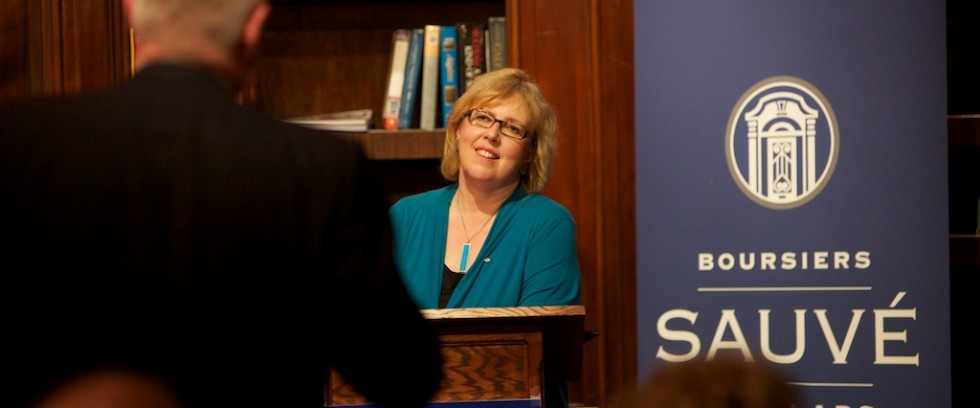
By Janet Jobson (Sauvé Scholar 2009-10 )
On Wednesday, 31 March, the Sauvé Foundation was honoured to welcome the leader of Canada’s Green Party, Ms. Elizabeth May, to speak on the topic Confronting Canada’s Triple Deficit – Ecological, Fiscal and Democratic. While much of the world’s attention is firmly focused on the financial crisis, Ms. May provided an impassioned account of how in fact this crisis, and the ensuing financial deficit in Canada, form smaller parts of a much larger set of interconnected issues.
She argued that the ecological and democratic deficits in Canada are the real barriers to prosperity and a continued quality of life for Canadians. Speaking very strongly against the centralizing impulse of the current Conservative government, and the failure of opposition parties to hold that government in check, Ms. May made a powerful argument for the importance of Canada shifting away from a ‘First Past the Post’ electoral system towards a ‘Proportional Representation’ (PR) or mixed methods system. In a PR system, she argued, it would be unimaginable for the Greens, who poll around 10% support nationwide, to not have a single seat in Parliament. Securing a shift in the electoral system and bolstering the power of Parliament would bring back into balance the democratic situation in Canada, which she argued has become increasingly imperiled. Ecologically, Ms. May pointed to the shifting targets of both the Liberal and Conservative governments over the last decade. Emphasizing that Canada is one of the globe’s largest polluters and contributors to Global Warming, Ms. May decried the lax action and continued expansion of the tar sands as factors that will in the short and long term increase the ecological deficit to unimagined levels. The Sauvé Scholars were privileged to have Ms. May join them the following day for breakfast where they discussed issues that ranged from her personal and professional life history, the platform of the Green Party, the state of action on climate change worldwide and the importance of taking action and getting involved. Ms. May’s generosity of her time, warm spirit and robust engagement undoubtedly made her one of the most memorable guests to Sauvé House. It is unsurprising that she is considered to be in the best position to be the first Green Party candidate elected to the House of Commons in the next elections.
About Elizabeth May
Elizabeth May is an environmentalist, writer, activist, lawyer, and leader of the Green Party of Canada. Elizabeth became active in the environmental movement in the 1970s. She is a graduate of Dalhousie Law School and was admitted to the Bar in both Nova Scotia and Ontario. She held the position of Associate General Council for the Public Interest Advocacy Centre prior to becoming Senior Policy Advisor to the federal minister of the Environment from 1986 until 1988. Elizabeth became Executive Director of the Sierra Club of Canada in 1989, a position she held until March 2006, when she stepped down to run for leadership of the Green Party of Canada. Elizabeth is the author of seven books, including her most recent Losing Confidence: Power, Politics and the Crisis in Canadian Democracy. Elizabeth holds three honourary doctorates, and the Elizabeth May Chair in Women’s Health and the Environment at Dalhousie University was created in her honour. She has served on the boards of numerous organizations, including the International Institute for Sustainable Development and as Vice-Chair of the National Round Table on Environment and Economy and is currently a Commissioner of the Earth Charter International Council. Elizabeth became an Officer of the Order of Canada in 2005, and was elected as leader of the Green Party of Canada in 2006.
